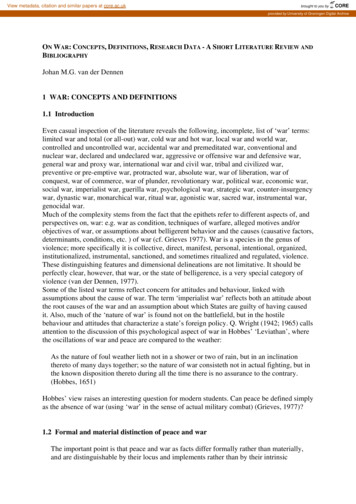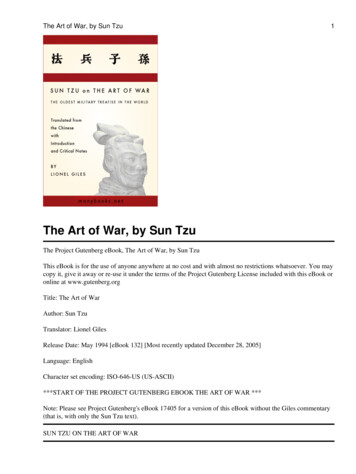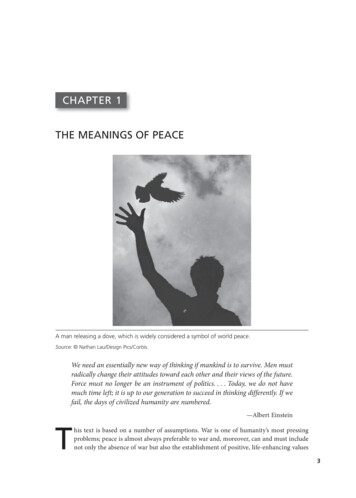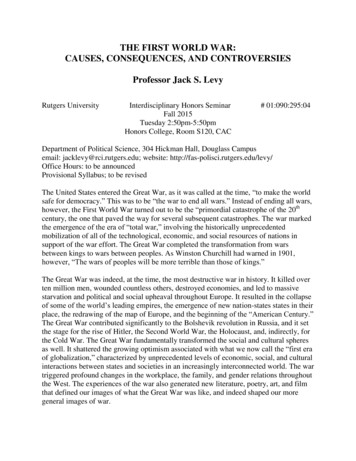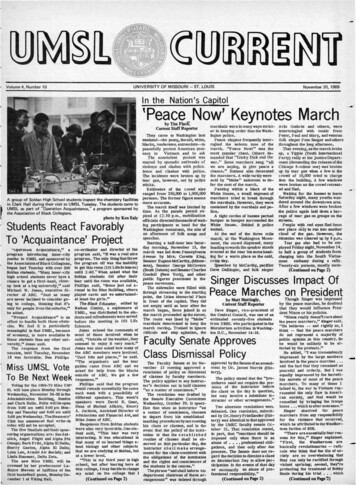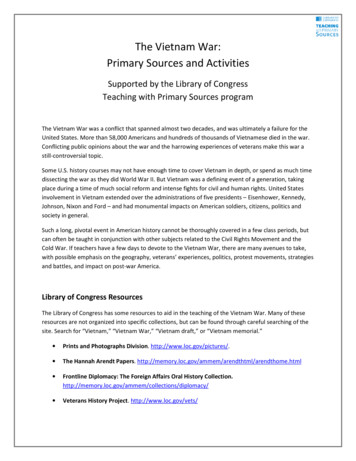
Transcription
The Project Gutenberg EBook of War and Peace, by Leo TolstoyThis eBook is for the use of anyone anywhere at no cost and withalmost no restrictions whatsoever. You may copy it, give it away orre-use it under the terms of the Project Gutenberg License includedwith this eBook or online at www.gutenberg.orgTitle: War and PeaceAuthor: Leo TolstoyTranslators: Louise and Aylmer MaudePosting Date: January 10, 2009 [EBook #2600]Last Updated: January 21, 2019Language: English*** START OF THIS PROJECT GUTENBERG EBOOK WAR AND PEACE ***An Anonymous Volunteer, and David WidgerWAR AND PEACE
By Leo Tolstoy/TolstoiCONTENTSBOOK ONE: 1805CHAPTER ICHAPTER IICHAPTER IIICHAPTER IVCHAPTER VCHAPTER VICHAPTER VIICHAPTER VIIICHAPTER IXCHAPTER XCHAPTER XICHAPTER XIICHAPTER XIIICHAPTER XIVCHAPTER XVCHAPTER XVICHAPTER XVIICHAPTER XVIIICHAPTER XIX
CHAPTER XXCHAPTER XXICHAPTER XXIICHAPTER XXIIICHAPTER XXIVCHAPTER XXVCHAPTER XXVICHAPTER XXVIICHAPTER XXVIIIBOOK TWO: 1805CHAPTER ICHAPTER IICHAPTER IIICHAPTER IVCHAPTER VCHAPTER VICHAPTER VIICHAPTER VIIICHAPTER IXCHAPTER XCHAPTER XICHAPTER XIICHAPTER XIIICHAPTER XIVCHAPTER XVCHAPTER XVICHAPTER XVII
CHAPTER XVIIICHAPTER XIXCHAPTER XXCHAPTER XXIBOOK THREE: 1805CHAPTER ICHAPTER IICHAPTER IIICHAPTER IVCHAPTER VCHAPTER VICHAPTER VIICHAPTER VIIICHAPTER IXCHAPTER XCHAPTER XICHAPTER XIICHAPTER XIIICHAPTER XIVCHAPTER XVCHAPTER XVICHAPTER XVIICHAPTER XVIIICHAPTER XIXBOOK FOUR: 1806CHAPTER I
CHAPTER IICHAPTER IIICHAPTER IVCHAPTER VCHAPTER VICHAPTER VIICHAPTER VIIICHAPTER IXCHAPTER XCHAPTER XICHAPTER XIICHAPTER XIIICHAPTER XIVCHAPTER XVCHAPTER XVIBOOK FIVE: 1806 - 07CHAPTER ICHAPTER IICHAPTER IIICHAPTER IVCHAPTER VCHAPTER VICHAPTER VIICHAPTER VIIICHAPTER IXCHAPTER XCHAPTER XI
CHAPTER XIICHAPTER XIIICHAPTER XIVCHAPTER XVCHAPTER XVICHAPTER XVIICHAPTER XVIIICHAPTER XIXCHAPTER XXCHAPTER XXICHAPTER XXIIBOOK SIX: 1808 - 10CHAPTER ICHAPTER IICHAPTER IIICHAPTER IVCHAPTER VCHAPTER VICHAPTER VIICHAPTER VIIICHAPTER IXCHAPTER XCHAPTER XICHAPTER XIICHAPTER XIIICHAPTER XIVCHAPTER XV
CHAPTER XVICHAPTER XVIICHAPTER XVIIICHAPTER XIXCHAPTER XXCHAPTER XXICHAPTER XXIICHAPTER XXIIICHAPTER XXIVCHAPTER XXVCHAPTER XXVIBOOK SEVEN: 1810 - 11CHAPTER ICHAPTER IICHAPTER IIICHAPTER IVCHAPTER VCHAPTER VICHAPTER VIICHAPTER VIIICHAPTER IXCHAPTER XCHAPTER XICHAPTER XIICHAPTER XIIIBOOK EIGHT: 1811 - 12
CHAPTER ICHAPTER IICHAPTER IIICHAPTER IVCHAPTER VCHAPTER VICHAPTER VIICHAPTER VIIICHAPTER IXCHAPTER XCHAPTER XICHAPTER XIICHAPTER XIIICHAPTER XIVCHAPTER XVCHAPTER XVICHAPTER XVIICHAPTER XVIIICHAPTER XIXCHAPTER XXCHAPTER XXICHAPTER XXIIBOOK NINE: 1812CHAPTER ICHAPTER IICHAPTER IIICHAPTER IV
CHAPTER VCHAPTER VICHAPTER VIICHAPTER VIIICHAPTER IXCHAPTER XCHAPTER XICHAPTER XIICHAPTER XIIICHAPTER XIVCHAPTER XVCHAPTER XVICHAPTER XVIICHAPTER XVIIICHAPTER XIXCHAPTER XXCHAPTER XXICHAPTER XXIICHAPTER XXIIIBOOK TEN: 1812CHAPTER ICHAPTER IICHAPTER IIICHAPTER IVCHAPTER VCHAPTER VICHAPTER VII
CHAPTER VIIICHAPTER IXCHAPTER XCHAPTER XICHAPTER XIICHAPTER XIIICHAPTER XIVCHAPTER XVCHAPTER XVICHAPTER XVIICHAPTER XVIIICHAPTER XIXCHAPTER XXCHAPTER XXICHAPTER XXIICHAPTER XXIIICHAPTER XXIVCHAPTER XXVCHAPTER XXVICHAPTER XXVIICHAPTER XXVIIICHAPTER XXIXCHAPTER XXXCHAPTER XXXICHAPTER XXXIICHAPTER XXXIIICHAPTER XXXIV
CHAPTER XXXVCHAPTER XXXVICHAPTER XXXVIICHAPTER XXXVIIICHAPTER XXXIXBOOK ELEVEN: 1812CHAPTER ICHAPTER IICHAPTER IIICHAPTER IVCHAPTER VCHAPTER VICHAPTER VIICHAPTER VIIICHAPTER IXCHAPTER XCHAPTER XICHAPTER XIICHAPTER XIIICHAPTER XIVCHAPTER XVCHAPTER XVICHAPTER XVIICHAPTER XVIIICHAPTER XIXCHAPTER XXCHAPTER XXI
CHAPTER XXIICHAPTER XXIIICHAPTER XXIVCHAPTER XXVCHAPTER XXVICHAPTER XXVIICHAPTER XXVIIICHAPTER XXIXCHAPTER XXXCHAPTER XXXICHAPTER XXXIICHAPTER XXXIIICHAPTER XXXIVBOOK TWELVE: 1812CHAPTER ICHAPTER IICHAPTER IIICHAPTER IVCHAPTER VCHAPTER VICHAPTER VIICHAPTER VIIICHAPTER IXCHAPTER XCHAPTER XICHAPTER XIICHAPTER XIII
CHAPTER XIVCHAPTER XVCHAPTER XVIBOOK THIRTEEN: 1812CHAPTER ICHAPTER IICHAPTER IIICHAPTER IVCHAPTER VCHAPTER VICHAPTER VIICHAPTER VIIICHAPTER IXCHAPTER XCHAPTER XICHAPTER XIICHAPTER XIIICHAPTER XIVCHAPTER XVCHAPTER XVICHAPTER XVIICHAPTER XVIIICHAPTER XIXBOOK FOURTEEN: 1812CHAPTER ICHAPTER II
CHAPTER IIICHAPTER IVCHAPTER VCHAPTER VICHAPTER VIICHAPTER VIIICHAPTER IXCHAPTER XCHAPTER XICHAPTER XIICHAPTER XIIICHAPTER XIVCHAPTER XVCHAPTER XVICHAPTER XVIICHAPTER XVIIICHAPTER XIXBOOK FIFTEEN: 1812 - 13CHAPTER ICHAPTER IICHAPTER IIICHAPTER IVCHAPTER VCHAPTER VICHAPTER VIICHAPTER VIIICHAPTER IX
CHAPTER XCHAPTER XICHAPTER XIICHAPTER XIIICHAPTER XIVCHAPTER XVCHAPTER XVICHAPTER XVIICHAPTER XVIIICHAPTER XIXCHAPTER XXFIRST EPILOGUE: 1813 - 20CHAPTER ICHAPTER IICHAPTER IIICHAPTER IVCHAPTER VCHAPTER VICHAPTER VIICHAPTER VIIICHAPTER IXCHAPTER XCHAPTER XICHAPTER XIICHAPTER XIIICHAPTER XIVCHAPTER XV
CHAPTER XVISECOND EPILOGUECHAPTER ICHAPTER IICHAPTER IIICHAPTER IVCHAPTER VCHAPTER VICHAPTER VIICHAPTER VIIICHAPTER IXCHAPTER XCHAPTER XICHAPTER XII
BOOK ONE: 1805
CHAPTER I“Well, Prince, so Genoa and Lucca are now just family estates of the Buonapartes. But I warn you,if you don’t tell me that this means war, if you still try to defend the infamies and horrors perpetratedby that Antichrist—I really believe he is Antichrist—I will have nothing more to do with you and youare no longer my friend, no longer my ‘faithful slave,’ as you call yourself! But how do you do? I seeI have frightened you—sit down and tell me all the news.”It was in July, 1805, and the speaker was the well-known Anna Pávlovna Schérer, maid of honorand favorite of the Empress Márya Fëdorovna. With these words she greeted Prince Vasíli Kurágin, aman of high rank and importance, who was the first to arrive at her reception. Anna Pávlovna had hada cough for some days. She was, as she said, suffering from la grippe; grippe being then a new wordin St. Petersburg, used only by the elite.All her invitations without exception, written in French, and delivered by a scarlet-liveriedfootman that morning, ran as follows:“If you have nothing better to do, Count (or Prince), and if the prospect of spending an evening witha poor invalid is not too terrible, I shall be very charmed to see you tonight between 7 and 10—Annette Schérer.”“Heavens! what a virulent attack!” replied the prince, not in the least disconcerted by thisreception. He had just entered, wearing an embroidered court uniform, knee breeches, and shoes, andhad stars on his breast and a serene expression on his flat face. He spoke in that refined French inwhich our grandfathers not only spoke but thought, and with the gentle, patronizing intonation naturalto a man of importance who had grown old in society and at court. He went up to Anna Pávlovna,kissed her hand, presenting to her his bald, scented, and shining head, and complacently seatedhimself on the sofa.“First of all, dear friend, tell me how you are. Set your friend’s mind at rest,” said he withoutaltering his tone, beneath the politeness and affected sympathy of which indifference and even ironycould be discerned.“Can one be well while suffering morally? Can one be calm in times like these if one has anyfeeling?” said Anna Pávlovna. “You are staying the whole evening, I hope?”“And the fete at the English ambassador’s? Today is Wednesday. I must put in an appearancethere,” said the prince. “My daughter is coming for me to take me there.”“I thought today’s fete had been canceled. I confess all these festivities and fireworks are becomingwearisome.”“If they had known that you wished it, the entertainment would have been put off,” said the prince,who, like a wound-up clock, by force of habit said things he did not even wish to be believed.“Don’t tease! Well, and what has been decided about Novosíltsev’s dispatch? You knoweverything.”“What can one say about it?” replied the prince in a cold, listless tone. “What has been decided?They have decided that Buonaparte has burnt his boats, and I believe that we are ready to burn ours.”Prince Vasíli always spoke languidly, like an actor repeating a stale part. Anna Pávlovna Schéreron the contrary, despite her forty years, overflowed with animation and impulsiveness. To be an
enthusiast had become her social vocation and, sometimes even when she did not feel like it, shebecame enthusiastic in order not to disappoint the expectations of those who knew her. The subduedsmile which, though it did not suit her faded features, always played round her lips expressed, as in aspoiled child, a continual consciousness of her charming defect, which she neither wished, nor could,nor considered it necessary, to correct.In the midst of a conversation on political matters Anna Pávlovna burst out:“Oh, don’t speak to me of Austria. Perhaps I don’t understand things, but Austria never has wished,and does not wish, for war. She is betraying us! Russia alone must save Europe. Our gracioussovereign recognizes his high vocation and will be true to it. That is the one thing I have faith in! Ourgood and wonderful sovereign has to perform the noblest role on earth, and he is so virtuous andnoble that God will not forsake him. He will fulfill his vocation and crush the hydra of revolution,which has become more terrible than ever in the person of this murderer and villain! We alone mustavenge the blood of the just one. Whom, I ask you, can we rely on?. England with her commercialspirit will not and cannot understand the Emperor Alexander’s loftiness of soul. She has refused toevacuate Malta. She wanted to find, and still seeks, some secret motive in our actions. What answerdid Novosíltsev get? None. The English have not understood and cannot understand the selfabnegation of our Emperor who wants nothing for himself, but only desires the good of mankind. Andwhat have they promised? Nothing! And what little they have promised they will not perform! Prussiahas always declared that Buonaparte is invincible, and that all Europe is powerless before him.And I don’t believe a word that Hardenburg says, or Haugwitz either. This famous Prussian neutralityis just a trap. I have faith only in God and the lofty destiny of our adored monarch. He will saveEurope!”She suddenly paused, smiling at her own impetuosity.“I think,” said the prince with a smile, “that if you had been sent instead of our dear Wintzingerodeyou would have captured the King of Prussia’s consent by assault. You are so eloquent. Will you giveme a cup of tea?”“In a moment. À propos,” she added, becoming calm again, “I am expecting two very interestingmen tonight, le Vicomte de Mortemart, who is connected with the Montmorencys through the Rohans,one of the best French families. He is one of the genuine émigrés, the good ones. And also the AbbéMorio. Do you know that profound thinker? He has been received by the Emperor. Had you heard?”“I shall be delighted to meet them,” said the prince. “But tell me,” he added with studiedcarelessness as if it had only just occurred to him, though the question he was about to ask was thechief motive of his visit, “is it true that the Dowager Empress wants Baron Funke to be appointed firstsecretary at Vienna? The baron by all accounts is a poor creature.”Prince Vasíli wished to obtain this post for his son, but others were trying through the DowagerEmpress Márya Fëdorovna to secure it for the baron.Anna Pávlovna almost closed her eyes to indicate that neither she nor anyone else had a right tocriticize what the Empress desired or was pleased with.“Baron Funke has been recommended to the Dowager Empress by her sister,” was all she said, in adry and mournful tone.As she named the Empress, Anna Pávlovna’s face suddenly assumed an expression of profound andsincere devotion and respect mingled with sadness, and this occurred every time she mentioned herillustrious patroness. She added that Her Majesty had deigned to show Baron Funke beaucoup
d’estime, and again her face clouded over with sadness.The prince was silent and looked indifferent. But, with the womanly and courtierlike quickness andtact habitual to her, Anna Pávlovna wished both to rebuke him (for daring to speak as he had done ofa man recommended to the Empress) and at the same time to console him, so she said:“Now about your family. Do you know that since your daughter came out everyone has beenenraptured by her? They say she is amazingly beautiful.”The prince bowed to signify his respect and gratitude.“I often think,” she continued after a short pause, drawing nearer to the prince and smiling amiablyat him as if to show that political and social topics were ended and the time had come for intimateconversation—“I often think how unfairly sometimes the joys of life are distributed. Why has fategiven you two such splendid children? I don’t speak of Anatole, your youngest. I don’t like him,” sheadded in a tone admitting of no rejoinder and raising her eyebrows. “Two such charming children.And really you appreciate them less than anyone, and so you don’t deserve to have them.”And she smiled her ecstatic smile.“I can’t help it,” said the prince. “Lavater would have said I lack the bump of paternity.”“Don’t joke; I mean to have a serious talk with you. Do you know I am dissatisfied with youryounger son? Between ourselves” (and her face assumed its melancholy expression), “he wasmentioned at Her Majesty’s and you were pitied.”The prince answered nothing, but she looked at him significantly, awaiting a reply. He frowned.“What would you have me do?” he said at last. “You know I did all a father could for theireducation, and they have both turned out fools. Hippolyte is at least a quiet fool, but Anatole is anactive one. That is the only difference between them.” He said this smiling in a way more natural andanimated than usual, so that the wrinkles round his mouth very clearly revealed somethingunexpectedly coarse and unpleasant.“And why are children born to such men as you? If you were not a father there would be nothing Icould reproach you with,” said Anna Pávlovna, looking up pensively.“I am your faithful slave and to you alone I can confess that my children are the bane of my life. Itis the cross I have to bear. That is how I explain it to myself. It can’t be helped!”He said no more, but expressed his resignation to cruel fate by a gesture. Anna Pávlovna meditated.“Have you never thought of marrying your prodigal son Anatole?” she asked. “They say old maidshave a mania for matchmaking, and though I don’t feel that weakness in myself as yet, I know a littleperson who is very unhappy with her father. She is a relation of yours, Princess Mary Bolkónskaya.”Prince Vasíli did not reply, though, with the quickness of memory and perception befitting a man ofthe world, he indicated by a movement of the head that he was considering this information.“Do you know,” he said at last, evidently unable to check the sad current of his thoughts, “thatAnatole is costing me forty thousand rubles a year? And,” he went on after a pause, “what will it bein five years, if he goes on like this?” Presently he added: “That’s what we fathers have to put upwith. Is this princess of yours rich?”“Her father is very rich and stingy. He lives in the country. He is the well-known Prince Bolkónskiwho had to retire from the army under the late Emperor, and was nicknamed ‘the King of Prussia.’ Heis very clever but eccentric, and a bore. The poor girl is very unhappy. She has a brother; I think you
know him, he married Lise Meinen lately. He is an aide-de-camp of Kutúzov’s and will be heretonight.”“Listen, dear Annette,” said the prince, suddenly taking Anna Pávlovna’s hand and for some reasondrawing it downwards. “Arrange that affair for me and I shall always be your most devotedslave-slafe with an f, as a village elder of mine writes in his reports. She is rich and of good familyand that’s all I want.”And with the familiarity and easy grace peculiar to him, he raised the maid of honor’s hand to hislips, kissed it, and swung it to and fro as he lay back in his armchair, looking in another direction.“Attendez,” said Anna Pávlovna, reflecting, “I’ll speak to Lise, young Bolkónski’s wife, this veryevening, and perhaps the thing can be arranged. It shall be on your family’s behalf that I’ll start myapprenticeship as old maid.”
CHAPTER IIAnna Pávlovna’s drawing room was gradually filling. The highest Petersburg society wasassembled there: people differing widely in age and character but alike in the social circle to whichthey belonged. Prince Vasíli’s daughter, the beautiful Hélène, came to take her father to theambassador’s entertainment; she wore a ball dress and her badge as maid of honor. The youthful littlePrincess Bolkónskaya, known as la femme la plus séduisante de Pétersbourg, * was also there. Shehad been married during the previous winter, and being pregnant did not go to any large gatherings,but only to small receptions. Prince Vasíli’s son, Hippolyte, had come with Mortemart, whom heintroduced. The Abbé Morio and many others had also come.* The most fascinating woman in Petersburg.To each new arrival Anna Pávlovna said, “You have not yet seen my aunt,” or “You do not knowmy aunt?” and very gravely conducted him or her to a little old lady, wearing large bows of ribbon inher cap, who had come sailing in from another room as soon as the guests began to arrive; and slowlyturning her eyes from the visitor to her aunt, Anna Pávlovna mentioned each one’s name and then leftthem.Each visitor performed the ceremony of greeting this old aunt whom not one of them knew, not oneof them wanted to know, and not one of them cared about; Anna Pávlovna observed these greetingswith mournful and solemn interest and silent approval. The aunt spoke to each of them in the samewords, about their health and her own, and the health of Her Majesty, “who, thank God, was bettertoday.” And each visitor, though politeness prevented his showing impatience, left the old womanwith a sense of relief at having performed a vexatious duty and did not return to her the wholeevening.The young Princess Bolkónskaya had brought some work in a gold-embroidered velvet bag. Herpretty little upper lip, on which a delicate dark down was just perceptible, was too short for her teeth,but it lifted all the more sweetly, and was especially charming when she occasionally drew it downto meet the lower lip. As is always the case with a thoroughly attractive woman, her defect—theshortness of her upper lip and her half-open mouth—seemed to be her own special and peculiar formof beauty. Everyone brightened at the sight of this pretty young woman, so soon to become a mother,so full of life and health, and carrying her burden so lightly. Old men and dull dispirited young oneswho looked at her, after being in her company and talking to her a little while, felt as if they too werebecoming, like her, full of life and health. All who talked to her, and at each word saw her brightsmile and the constant gleam of her white teeth, thought that they were in a specially amiable moodthat day.The little princess went round the table with quick, short, swaying steps, her workbag on her arm,and gaily spreading out her dress sat down on a sofa near the silver samovar, as if all she was doingwas a pleasure to herself and to all around her. “I have brought my work,” said she in French,displaying her bag and addressing all present. “Mind, Annette, I hope you have not played a wickedtrick on me,” she added, turning to her hostess. “You wrote that it was to be quite a small reception,and just see how badly I am dressed.” And she spread out her arms to show her short-waisted, lacetrimmed, dainty gray dress, girdled with a broad ribbon just below the breast.“Soyez tranquille, Lise, you will always be prettier than anyone else,” replied Anna Pávlovna.
“You know,” said the princess in the same tone of voice and still in French, turning to a general,“my husband is deserting me? He is going to get himself killed. Tell me what this wretched war isfor?” she added, addressing Prince Vasíli, and without waiting for an answer she turned to speak tohis daughter, the beautiful Hélène.“What a delightful woman this little princess is!” said Prince Vasíli to Anna Pávlovna.One of the next arrivals was a stout, heavily built young man with close-cropped hair, spectacles,the light-colored breeches fashionable at that time, a very high ruffle, and a brown dress coat. Thisstout young man was an illegitimate son of Count Bezúkhov, a well-known grandee of Catherine’stime who now lay dying in Moscow. The young man had not yet entered either the military or civilservice, as he had only just returned from abroad where he had been educated, and this was his firstappearance in society. Anna Pávlovna greeted him with the nod she accorded to the lowest hierarchyin her drawing room. But in spite of this lowest-grade greeting, a look of anxiety and fear, as at thesight of something too large and unsuited to the place, came over her face when she saw Pierre enter.Though he was certainly rather bigger than the other men in the room, her anxiety could only havereference to the clever though shy, but observant and natural, expression which distinguished himfrom everyone else in that drawing room.“It is very good of you, Monsieur Pierre, to come and visit a poor invalid,” said Anna Pávlovna,exchanging an alarmed glance with her aunt as she conducted him to her.Pierre murmured something unintelligible, and continued to look round as if in search of something.On his way to the aunt he bowed to the little princess with a pleased smile, as to an intimateacquaintance.Anna Pávlovna’s alarm was justified, for Pierre turned away from the aunt without waiting to hearher speech about Her Majesty’s health. Anna Pávlovna in dismay detained him with the words: “Doyou know the Abbé Morio? He is a most interesting man.”“Yes, I have heard of his scheme for perpetual peace, and it is very interesting but hardly feasible.”“You think so?” rejoined Anna Pávlovna in order to say something and get away to attend to herduties as hostess. But Pierre now committed a reverse act of impoliteness. First he had left a ladybefore she had finished speaking to him, and now he continued to speak to another who wished to getaway. With his head bent, and his big feet spread apart, he began explaining his reasons for thinkingthe abbé’s plan chimerical.“We will talk of it later,” said Anna Pávlovna with a smile.And having got rid of this young man who did not know how to behave, she resumed her duties ashostess and continued to listen and watch, ready to help at any point where the conversation mighthappen to flag. As the foreman of a spinning mill, when he has set the hands to work, goes round andnotices here a spindle that has stopped or there one that creaks or makes more noise than it should,and hastens to check the machine or set it in proper motion, so Anna Pávlovna moved about herdrawing room, approaching now a silent, now a too-noisy group, and by a word or slightrearrangement kept the conversational machine in steady, proper, and regular motion. But amid thesecares her anxiety about Pierre was evident. She kept an anxious watch on him when he approachedthe group round Mortemart to listen to what was being said there, and again when he passed toanother group whose center was the abbé.Pierre had been educated abroad, and this reception at Anna Pávlovna’s was the first he hadattended in Russia. He knew that all the intellectual lights of Petersburg were gathered there and, like
a child in a toyshop, did not know which way to look, afraid of missing any clever conversation thatwas to be heard. Seeing the self-confident and refined expression on the faces of those present he wasalways expecting to hear something very profound. At last he came up to Morio. Here theconversation seemed interesting and he stood waiting for an opportunity to express his own views, asyoung people are fond of doing.
CHAPTER IIIAnna Pávlovna’s reception was in full swing. The spindles hummed steadily and ceaselessly on allsides. With the exception of the aunt, beside whom sat only one elderly lady, who with her thincareworn face was rather out of place in this brilliant society, the whole company had settled intothree groups. One, chiefly masculine, had formed round the abbé. Another, of young people, wasgrouped round the beautiful Princess Hélène, Prince Vasíli’s daughter, and the little PrincessBolkónskaya, very pretty and rosy, though rather too plump for her age. The third group was gatheredround Mortemart and Anna Pávlovna.The vicomte was a nice-looking young man with soft features and polished manners, who evidentlyconsidered himself a celebrity but out of politeness modestly placed himself at the disposal of thecircle in which he found himself. Anna Pávlovna was obviously serving him up as a treat to herguests. As a clever maître d’hôtel serves up as a specially choice delicacy a piece of meat that no onewho had seen it in the kitchen would have cared to eat, so Anna Pávlovna served up to her guests,first the vicomte and then the abbé, as peculiarly choice morsels. The group about Mortemartimmediately began discussing the murder of the Duc d’Enghien. The vicomte said that the Ducd’Enghien had perished by his own magnanimity, and that there were particular reasons forBuonaparte’s hatred of him.“Ah, yes! Do tell us all about it, Vicomte,” said Anna Pávlovna, with a pleasant feeling that therewas something à la Louis XV in the sound of that sentence: “Contez nous çela, Vicomte.”The vicomte bowed and smiled courteously in token of his willingness to comply. Anna Pávlovnaarranged a group round him, inviting everyone to listen to his tale.“The vicomte knew the duc personally,” whispered Anna Pávlovna to one of the guests. “Thevicomte is a wonderful raconteur,” said she to another. “How evidently he belongs to the bestsociety,” said she to a third; and the vicomte was served up to the company in the choicest and mostadvantageous style, like a well-garnished joint of roast beef on a hot dish.The vicomte wished to begin his story and gave a subtle smile.“Come over here, Hélène, dear,” said Anna Pávlovna to the beautiful young princess who wassitting some way off, the center of another group.The princess smiled. She rose with the same unchanging smile with which she had first entered theroom—the smile of a perfectly beautiful woman. With a slight rustle of her white dress trimmed withmoss and ivy, with a gleam of white shoulders, glossy hair, and sparkling diamonds, she passedbetween the men who made way for her, not looking at any of them but smiling on all, as if graciouslyallowing each the privilege of admiring her beautiful figure and shapely shoulders, back, and bosom—which in the fashion of those days were very much exposed—and she seemed to bring the glamourof a ballroom with her as she moved toward Anna Pávlovna. Hélène was so lovely that not only didshe not show any trace of coquetry, but on the contrary she even appeared shy of her unquestionableand all too victorious beauty. She seemed to wish, but to be unable, to diminish its effect.“How lovely!” said everyone who saw her; and the vicomte lifted his shoulders and dropped hiseyes as if startled by something extraordinary when she took her seat opposite and beamed upon himalso with her unchanging smile.
“Madame, I doubt my ability before such an audience,” said he, smilingly inclining his head.The princess rested her bare round arm on a little table and considered a reply unnecessary. Shesmilingly waited. All the time the story was being told she sat upright, glancing now at her beautifulround arm, altered in shape by its pressure on the table, now at her still more beautiful bosom, onwhich she readjusted a diamond necklace. From time to time she smoothed the folds of her dress, andwhenever the story produced an effect she glanced at Anna Pávlovna, at once adopted just theexpression she saw on the maid of honor’s face, and again relapsed into her radiant smile.The little princess had also left the tea table and followed Hélène.“Wait a moment, I’ll get my work. Now then, what are you thinking of?” she went on, turning toPrince Hippolyte. “Fetch me my workbag.”There was a general movement as the princess, smiling and talking merrily to everyone at once, satdown and gaily arranged herself in her seat.“Now I am all right,” she said, and asking the vicomte to begin, she took up her work.Prince Hippolyte, having brought the workbag, joined the circle and moving a chair close to hersseated himself beside her.Le charmant Hippolyte was surprising by his extraordinary resemblance to his beautiful sister, butyet more by the fact that in spite of this resemblance he was exceedingly ugly. His features were likehis sister’s, but while in her case everything was lit up by a joyous, self-satisfied, youthful, andconstant smile of animation, and by the wonderful classic beauty of her figure, his face on the contrarywas dulled by imbecility and a constant expression of sullen self-confidence, while his body was thinand weak. His eyes, nose, and mouth all seemed puckered into a vacant, wearied grimace, and hisarms and legs always fell into unnatural positions.“It’s not going to be a ghost story?” said he, sitting down beside the princess and hastily adjustinghis lorgnette, as if without this instrument he could not begin to speak.“Why no, my dear fellow,” said the astonished narrator, shrugging his shoulders.“Because I hate ghost stories,” said Prince Hippolyte in a tone which showed that he onlyunderstood the meaning of his words after he had uttered them.He spoke with such self-confidence that his hearers could not be sure whether what he said wasvery witty or very stupid. He was dressed in a dark-green dress coat, knee breeches of the color ofcuisse de nymphe effrayée, as he called it, shoes, and silk stockings.The vicomte told his tale very neatly. It was an anecdote, then c
The Project Gutenberg EBook of War and Peace, by Leo Tolstoy This eBook is for the use of anyone anywhere at no cost and with almost no restrictions whatsoever. You may copy it, give it away or re-use it under the terms of the Project Gutenberg License included with this eBook or online at www.gutenberg.org Title: Wa
